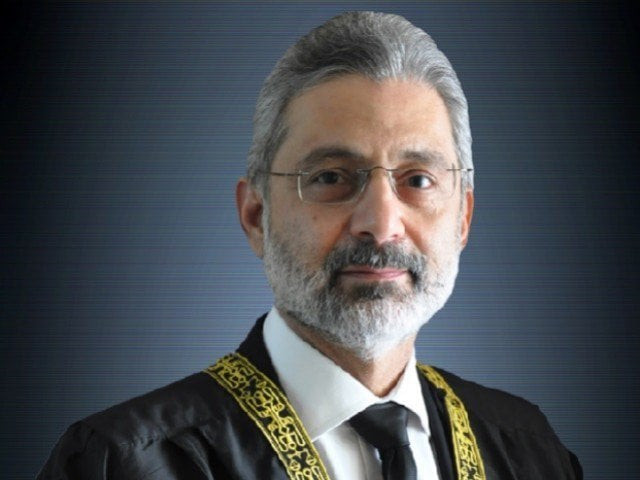Family subjected to covert surveillance: Justice Isa
Says president did not form his opinion ‘lawfully’ and had ‘violated’ the Constitution

Justice Qazi Faez Isa. PHOTO: FILE
“Surveillance of a judge and his family is not envisaged under this law, therefore, all those who did so are now liable for criminal prosecution which this court may be graciously pleased to order,” stated Justice Isa in his written synopsis submitted in the apex court.
Last year in May, a presidential reference was instituted against the top court judge accusing him of concealing his properties in the United Kingdom, allegedly held in the name of his wife and children.
The judge subsequently wrote three letters to President Arif Alvi, which were eventually leaked to the media.
The judge complained that selective leaks of the reference to the media amounted to his character assassination, thus jeopardising his right to due process and fair trial.
In the synopsis, Justice Isa requested the apex court to quash the reference along with the proceedings before the Supreme Judicial Council.
The written statement requested the SC to initiate contempt proceedings against all concerned and criminal action against those who performed surveillance of the petitioner and his family for gathering their personal information.
Justice Isa referred to two judgments which categorically declared that covert surveillance of judges was unconstitutional and violated Articles 9 and 14 and the principle of the independence of the judiciary.
It was also stated that a common man would not trust the judges and the sanctity and independence of their decisions if he believed that the personal information of the judges was being secretly gathered.
“Public trust and confidence in the judiciary lie at the very heart of administration of justice and maintenance of public order,” the statement said.
The judge said that the federation had itself filed documents which showed the lack of respect they had for the privacy of a judge and his family.
“The federation’s reply itself shows that the ARU hired a private investigation agency in the UK to find out every place that the petitioner’s children had resided in the last 10-years.
If the federation is willing to pay a private investigation agency to surveil the petitioner – is it farfetched to imagine that they also used state intelligence agencies for such purpose.
The amount spent by the executive on the surveillance of a judge of this court and his family has not been disclosed nor what public funds were accessed and used for this purpose,” said the written submission.
It was further maintained that the apartments were never bought through an offshore company for the purpose of identity concealment or tax evasion in the United Kingdom but the properties had always been in the names of the petitioner’s non-dependent wife and non-dependent children.
The statement said there was no obligation under Section 116 of the Income Tax Ordinance 2001 to disclose the assets owned by non-dependent spouse and children.
It was stated that there was no violation of any money laundering laws either by the petitioner or his family.
The document said that the president did not form his opinion “lawfully” and had “violated” the constitution.
“It is respectfully submitted that the reference is based upon mala fide in fact and mala fide in law to serve a collateral purpose and is motivated by ill-will.
The reference is based upon material and information that was collected through unlawful means and by unauthorized persons, including the chairman ARU and the law minister and all those who they directed to do so.
All such information was collected by violating several laws and through covert surveillance of the petitioner and his family by using unlawful means. Therefore, any opinion formed by the president (himself or on the advice of prime minister) on the basis of such unlawfully collected material is also tainted with illegality. The petitioner is entitled to similar standards and protections as available to any ordinary citizen,” stated the submission.



















COMMENTS
Comments are moderated and generally will be posted if they are on-topic and not abusive.
For more information, please see our Comments FAQ